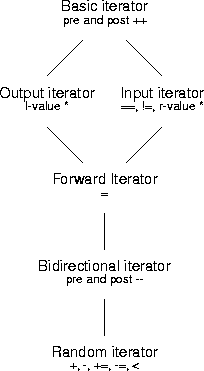- references to values in a sequence
- the unary
*operator follows an iterator to its value
- there are five types of iterators arranged in an hierarchy
-

- each type adds operators to the previous type
- all iterators respond to pre and post
++-
++itr- advance the iteratoritrto the next element and return the newly advanced iterator -
itr++- remember the iteratoritr, advanceitrto the next element and return the olditr
-
- the equality operators
==and!=- tests if two iterators refer to the same value or two different values- be careful - it's not a test of the values being referred to
- r-value
*itr- return the value being referenced by the iteratoritr- it's called r-value
*because it can only appear on the right-hand side of an assignment statement - ifitris an input iterator, than-
i = *itr;is correct because*is being used to readitr -
*itr = i;is incorrect because*is being used to writeitr
-
- it's called r-value
- l-value
*itr- return the location being referenced by the iteratoritr- it's called l-value
*because it can only appear on the left-hand side of an assignment statement - ifitris an output iterator, than-
i = *itr;is incorrect because*is being used to readitr -
*itr = i;is correct because*is being used to writeitr
-
- it's called l-value
- all the operators for both read and write iterators
-
*itr = *itr + 1;is correct for a forward iterator
-
- all the operations for forward iterators
- pre and post
--- for moving the iterator back to the previous value
- all the operators for bidirectional iterators
- iterator-integer addition and subtraction
-
x = *(itr + 5)
-
- addition- and subtraction-assignment
+=and-=for jumping around-
itr += 5
-
- iterator-iterator subtraction for finding distances between iterators
-
cnt = end_itr - start_itr - 1; - just as with pointers, the two iterators being subtracted must be from the same container for the subtraction to be meaningful - but the compiler doesn't (can't) check to make sure
-
- the
<operator - does one iterator refer to a value earlier in the sequence than another iterator
- why not just make all iterators random
- principle of least privilege
- not all containers can support all iterator operations efficiently
(start, end),
- the end iterator refers to the value just past the end of the range
- standard C-C++ pointer practice
-

- the end iterator may point to a non-existent element
- only sensible if
startandendrefers to values within the same container
- each container class defines its own iterator type
-
vector<T>::iterator -
vector<T>::const_iterator - there are others
-
- each container class has member functions that return iterators
-
begin()- return an iterator to the first element in a container- what does this do
vector<int> ivec; vector<int>::iterator start = ivec.begin();
- what does this do
-
end()- return an iterator to the last element in a container -
vector<int>::iterator five = find(ivec.start(), ivec.end(), 5); - there are others
-